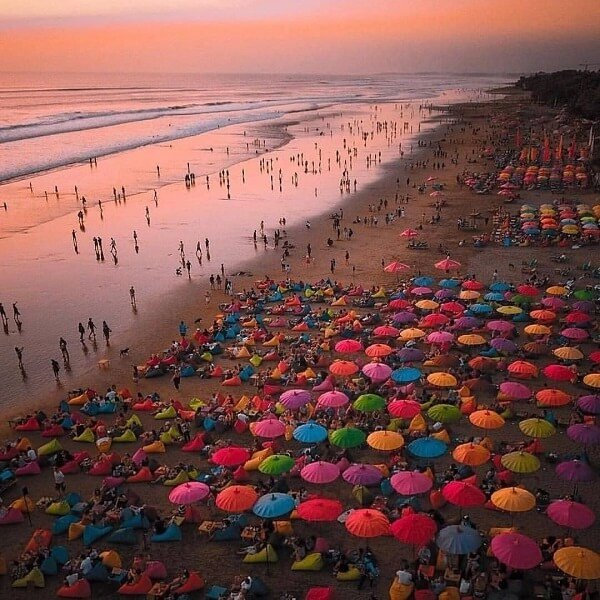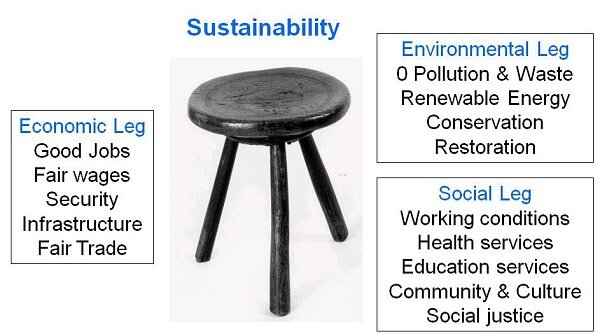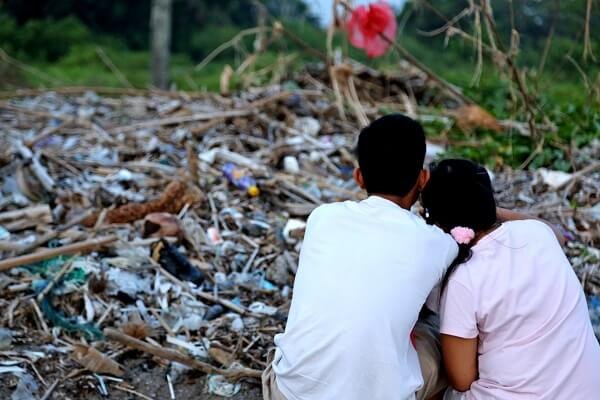Bali is now open for tourism! With the return of Visa On Arrival (VOA), and the scrap of quarantine rules, Bali’s tourism is set for revival. Many are enthusiastic but is tourism as good for Bali as they think?
After more than 2 years of pandemic, Bali’s tourism industry has been hardly hit and the over dependence of this sector has left the economy on its knees. Obviously, local operators are thrilling, but the unsustainability of this industry isn’t the best news if nothing evolved from how it was previously done.
Bali’s Double Six beach pre-pandemic
The case for sustainability
“Sustainability” means the equilibrium between economy, environment and society. When one of the stool’s legs illustrated below is shorter or missing, what happens? Yes, THAT!
Economy Vs. Ecology?
Economy aside, there is a positive way to look at the decrease of visitors: the environmental benefits. Indeed, tourism is responsible for a significant increase in trash pollution and water scarcity and the pandemic has been an environmental stress relief, a recovery from the trauma the ecosystem suffers from when its resources were over-exploited by mass tourism.
First the trash. The raining season is usually called “Trash Season” as everything littered on the rivers banks during the dry reason is flushed down into the river itself and ends up on the beaches. Believe it or not, tourists do not like it. TripAdvisor and other websites are often full of visitors’ complaints that Ba is very dirty.
The love for Bali trashed the island - pic @JGpics
Back in 2017, at the time where Agung volcano was erupting, stopping all flights from and to Bali, I already wrote that it “should be considered as a wake-up call for tourism actors to protect their own future and the future of the population who relies on a sustainable tourism industry for both employment and access to freshwater”. The consequences faced by Bali’s tourism due to Agung’s threat of eruption was also good examples of what would happen in case of water scarcity. Water shortages would indeed have negative impacts on the island’s image and create operational issues leading to hotel closures with associated unemployment rise. But of course, nobody learned and Covid showed up, destroying everything the island was so dependent on.
Both Agung’s volcano and the depletion of the water tables are time-ticking bombs, but while there is nothing we can do to avoid a volcano to erupt, there is a solution to the Bali’s water crisis through the Bali Water Protection program of IDEP Foundation, also a leading NGO in Mt Agung assistance to displaced population.
A social issue
Besides the economic and environmental aspects of tourism, something often left out from the news is the social impact that tourism has on Bali. In the past, I worked for a filmmaker who spent 12 years documenting the same village in Bali’s North coast, Buleleng. In such a lengthy period, he noticed how people changed, with more greed and associated village fights popping up, the sale of generation-owned land to make space for villas and all. But what was the most heartbreaking was the story of a hotel worker in South Bali who couldn’t go back to witness the final days of a relative because of the distance, and how many couldn’t go back to the village more than twice a year because of the time, distance and funds issue. In other words, many villages lost their active population to tourism, as the island’s governors acknowledged:
“For a generation, young people have been drawn from villages in northern Bali to work in the tourist centres, mainly in southern Bali.”
And while the above is true for Bali itself, the issue expands to the whole country as many bali workers are from other islands, leaving everything behind, including their kids under relatives’ care.
While the governor also said that “many attend tourism vocational schools before taking jobs in hotels, restaurants and tour agencies”, it is also true that even more take-on jobs without any skills. In a society where youths are pressured to support their household, marry young and have kids not any less younger, earning a living quickly overcomes the need to attend university, let alone regular school, in order to support their parents, and soon enough, their own family. While some returned to education or became entrepreneurs in another field, it is astonishing how many nany, drivers or waitresses posted desperate posts on Facebook groups asking for jobs.
Screenshots from Facebook groups
In short, Bali’s tourism as done today is a threat to all aspects of sustainability, and only a focus on sustainable tourism will preserve the island’s beauty and its amazing cultural and societal balance.




